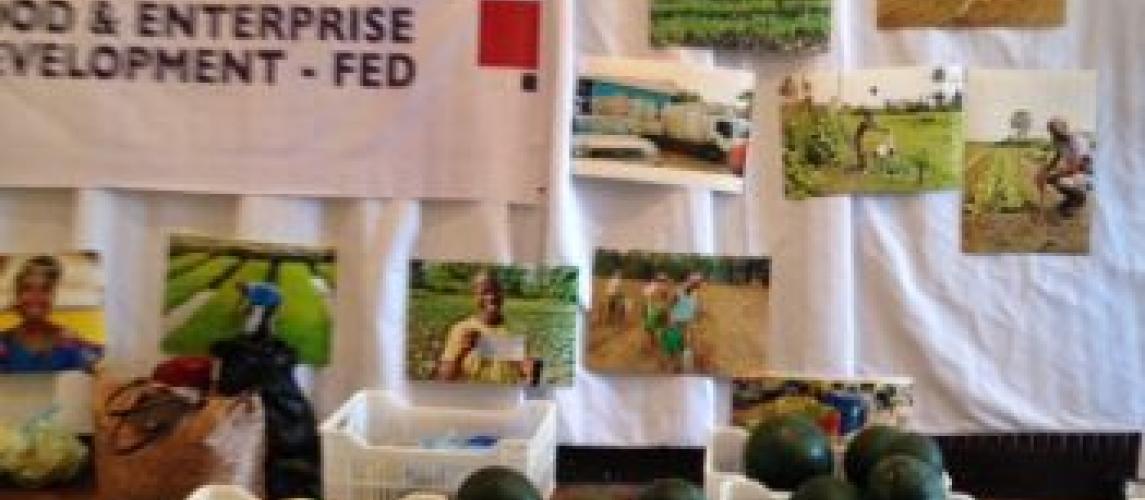
MSMEs Second National Conference and Trade Fair, and the launching of Liberia’s National Trade Policy and National Export Strategy 2014.
MSMEs Second National Conference and Trade Fair, and the launching of Liberia’s National Trade Policy and National Export Strategy 2014.
Theme: “From Vision to Implementation Together: Buying Liberian, Building Liberia”
The two-day conference focused on enterprise-development promotion, inclusive economic growth and empowerment of Liberia’s MSMEs, and brought together 500 participants from Liberia’s MSMEs, banks, microfinance institutions and multinational corporations.
The Conference also provided opportunities for participants to explore ways to break down national and international obstacles to inclusive economic growth and empowerment of Liberians in the Agribusiness with a focus on cotton, rice and cassava.
As part of the event, experts from Liberia, ECOWAS and other regions were exploring practical steps that financial institutions, concessionaires, MSMEs and the government can take to accelerate profitability, sustainable and inclusive economic growth for Liberian MSMEs.
Therefore, the National Export Strategy would provide support to six key sectors where the best opportunities exists to generate export diversification; namely rice, oil palm, rubber, cocoa, cassava, and fisheries. The National Trade Policy is government’s overarching strategy for steering the country towards regional integration into ECOWAS and multilateral integration into the World Trade Organization.
Addressing the conference, H.E. Madam Ellen Johnson Sirleaf, highlighted the National Trade Policy as government’s strong commitment to accessing the World Trade Organization because it has multiple benefits and open markets create new opportunities not only domestically but regionally and internationally.
The Minister of Commerce & Industry, Hon. Axel M. Addy emphasized that Liberia has a competitive advantage in fully utilizing these areas for MSMEs development; showcasing a diverse selection of top MSMEs that successfully meet market demands, despite the many barriers encountered in building profitable and sustainable businesses. Research has proved that most multinationals today were once SMEs. The Minister indicated that SMEs drive over 90% of ECOWAS economic activities, with a jurisdiction of about 250 million people across 15 member States. SMEs are contributing immensely to economic growth in South Saharan Africa. More importantly, the most significant employment potential in Liberia is with small and medium-sized enterprises (SMEs/ 5-50 employees), providing two thirds of all formal jobs in developing countries and up to 80% in low-income countries. (ILO) SMEs contribute over 45% to employment and 33% to GDP. Another aspect one cannot afford to ignore is how Liberian MSMEs can benefit from the government’s 25% procurement local rules. This initiative is meant to empower local production and create market access for Liberian made products.
Making remarks earlier, the Executive Director of the International Trade Center (ITC), Ms. Arancha Gonzalez said MSMEs is at the heart of the Liberian economy and by supporting these small entrepreneurs the country prospers. She said at the ITC, key to assisting Liberia’s MSMEs, is the need to unlock productivity, marketability, competitiveness, value-addition to ensure that they become the engines for job creation in the country and they are able to move their operations beyond the confines of their towns and cities in which they operate.
She stressed that to make that happen, there had to be the launch of a National Trade Policy and a National Export Strategy. “These are not just bureaucratic documents; they are a compass to achieve greater competitiveness starting with priority areas where Liberian companies, enterprises, entrepreneurs have a comparative advantage on which they have to build,” she said, adding that this is not the end but a start from somewhere. Two other sectors they are contemplating on including are the tourism and furniture sectors which hold huge potentials for MSMEs in Liberia.
Also, the Resident Representative of the International Finance Corporation, Mr. Frank Ajilore said his organization continues to increase its investment in the key priority areas which includes agriculture, mining, financial services, and infrastructural development.
He disclosed that recently the Board approved a five-year SMEs ventures plan for Liberia which will include support for the West African Ventures Fund which is fund they invested in three years ago focusing on Liberia and Sierra Leone. In Liberia, the fund has invested in 13 enterprises and will continue to evaluate such opportunities and increase its portfolio.
The United States Ambassador to Liberia, Debora Malac said a favourable business climate encourages the growth of MSMEs and promotes the commercialization of food value chains.
The conference was held in partnership with the International Finance Corporation-World Bank Group, United States Agency for International Development (USAID-Liberia), Government of Japan, Building Markets, The MarketPlace, BSC Monrovia, Liberia/IBEX (Volunteers for Economic Growth Alliance), Global Communities-Partners for Good, World Intellectual Property Organization, ITC, among others.
